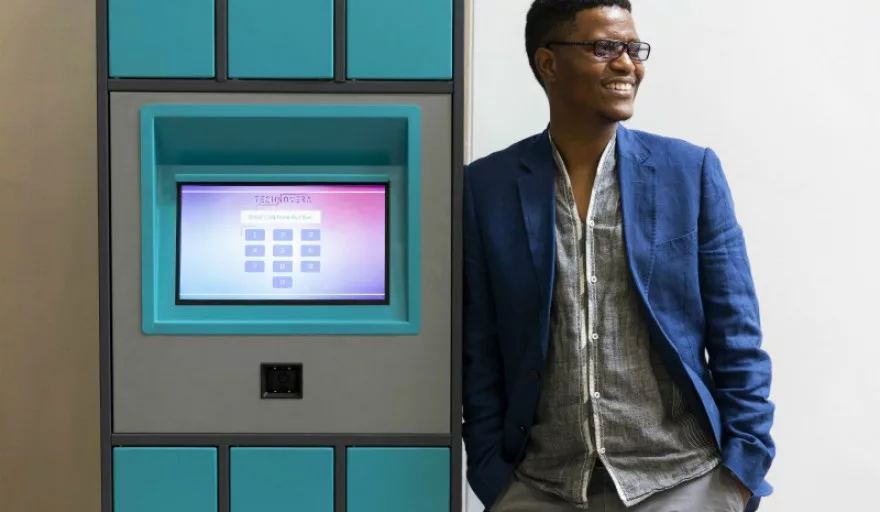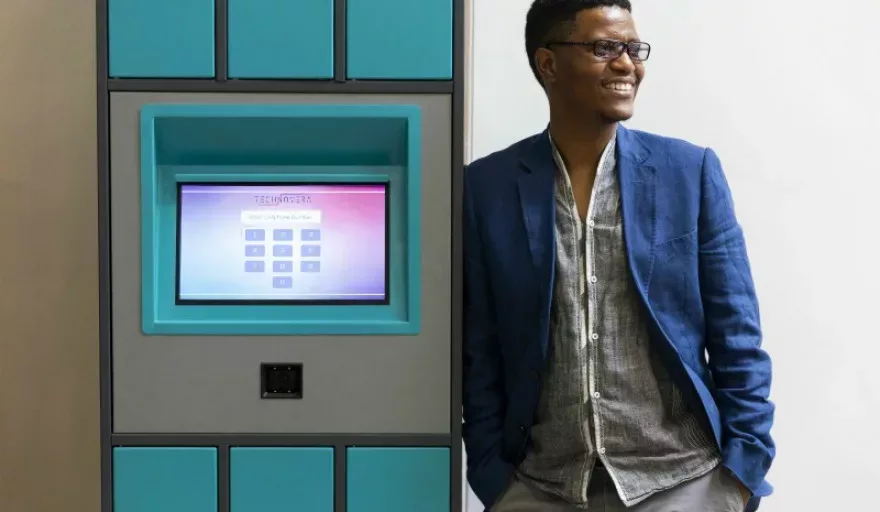
With more than 4.7 million patients collecting monthly treatments from public clinics, South Africa has the world’s largest antiretroviral therapy programme. Yet despite this, it currently takes roughly three and a half hours to collect medicine in some instances, a statistic resulting in profound social and economic costs across the country.
Aiming to tackle this fundamental issue, Neo Hutiri, a South African electrical engineer, and his team at Technovera developed Pelebox – a smart locker system designed to dispense medicine to patients with chronic conditions, cutting down queues and easing pressure on the healthcare system.
Having won the Royal Academy of Engineering’s prestigious 2019 Africa Prize for Engineering Innovation, we spoke with Hutiri to find out just how transformative such a technology could be to South Africa’s and indeed the entire continent’s healthcare system.
Africa Outlook (AfO): Could you tell me a bit about yourself? What inspired you to launch and develop Pelebox?
Neo Hutiri (NH): In 2014 I was diagnosed with turberculos, so my journey started as a patient. Standing in another three hour long queue to collect my chronic medication, I thought about how I could use my engineering and manufacturing background to solve the problem in front of me. I wanted to create technology that served people. I had studied electrical engineering and then worked at a steel manufacturing company before undertaking my masters in industrial engineering, looking at how to solve bottlenecks in systems using engineering. I had the right skills and experience to develop such a solution.
My journey with managing my disease is what launched me into the healthcare space – Technovera was born out of this frustration. I set out to build a social impact company that focused on the inclusion of technology with the aim of improving the last mile for chronic medication access in Africa. Technovera has developed Pelebox, a smart locker system that enables patients to collect their repeat chronic medication in under a minute instead of waiting for hours in queues at public clinics.
AfO: Why is improving access to healthcare across Africa so important?
NH: Without proper healthcare, African economies will continue to suffer. Strained public healthcare systems struggle to meet the needs of all patients. For example, South Africa has the world’s biggest antiretroviral therapy (ART) programme for patients living with HIV and AIDS, and there’s been a steady increase in the number of patients with non-communicable diseases requiring chronic therapy. A patient’s experience tends to be one of long waiting times, typically above three hours. This poses potential adherence barriers which may lead to poor health outcomes and place a strain on the patients in terms of transport costs and loss of income.
Pelebox could work anywhere in the world where patients go to collect chronic medicine. If we can remove the patients collecting repeat medicine from the queue, we not only give them back a large amount of time over a year, making them more productive, we also remove thousands of people from the queue so that others can see doctors and nurses faster. Making chronic medicine collection more convenient increases the likelihood that these patients will adhere to their treatment programmes. So, it’s not just solving the problem that patients on chronic medication have, it’s also improving the healthcare system overall.
We live in a world where tech promises to do so much more. Technology inclusion is an important theme in healthcare. It’s for this reason that our technology is leveraging the power of the internet of things through internet-enabled smart locker devices. The solution can remotely track medication collection and treatment compliance while automating visibility on patient behaviour and patient outcome.
AfO: In your eyes, what more needs to be done?
NH: There is so much more that needs to be done. Governments need to create healthcare systems that are more efficient, managed effectively, and better staffed. Both the public and private sector can do more to support entrepreneurs such as myself, who develop systems to improve the healthcare system. It’s about enabling those that have the will and the energy to solve these challenges. This is an opportunity for socially minded entrepreneurs to contribute to addressing access to healthcare challenges faced by a country.
AfO: Can you tell me about the company’s ‘Think Inside’ principle and explain the motivations behind it?
NH: We live in a world that is consumption focused. Everyday we are told that we need to be disruptive for disruption’s sake, redefine the status quo and think outside the box – these terms have become mainstream in the tech space. We want to build fast and ship products quickly so that we can remain relevant. This drive for more and more is pushing entrepreneurs and engineers to contribute bad products that do not further human prosperity.
In complex countries like South Africa, riddled with limitations and constraints, disruption alone is not enough. Designing technology without paying attention to this local context will result in failure. Parachuting tech into spaces without really paying attention to the human need or embracing its complexity contributes to the creation of dystopia.
At Technovera, we have set out to embrace our local challenges as an opportunity to define our own box. This box encourages creativity and shapes our frugal, relevant and context driven innovations. We call our highly localised approach to innovation the ‘Think Inside’ principle.
AfO: Is Pelebox’s technology still in the development phase or is it currently being rolled out?
NH: We installed a pilot site in 2017, and have since then installed five more systems in South African public clinics. We’ve now got a national contract with the SA government, and by July 2019 we should have 14 installed in total, with many more planned. We’ve had over 10,000 patient collections with a 100 percent accuracy rate, and we’re now working on building more features into the system.
AfO: How has your involvement with the Africa Prize for Engineering helped to further your ambitions?
NH: During our time as part of the Africa Prize, some of the programme partners helped improve our focus areas, which included improvement in manufacturing, as well as building a brand that fits the type of work that we do. One of the most important pillars of the Africa Prize for Engineering Innovation is the calibre of socially minded entrepreneurs building the face of Africa. The fact that the Prize brings together some of the best engineering minds across the continent to learn from each other and find opportunities to collaborate is by far the best value that I could have asked for, while together, creating best practices of how to build successful innovations and successful businesses.
AfO: How will the prize money and this accolade accelerate your efforts?
NH: We will use the prize money to increase our manufacturing capacity in South Africa. We also plan to build medicine tracking into our system to assist the clinics with data that can improve public healthcare. The next step is to reach more sites and find partners that are interested in working with us to reach five million patients.
AfO: I also see the company works with a range of different partners and sponsors. Why are such collaborations crucial?
NH: One of my favourite phrases is ‘standing on the shoulders of giants’. As an engineer, the foundation of my training emphasised learning from those who have come before you, gaining experience and inspiration from those who have built amazing things and allowing that to be the fuel for great design and innovation. Collaborations are extremely valuable to startups and businesses that are scaling up. It’s our partners and sponsors who have enabled us to reach this level of excellence in innovation, design and manufacturing.
Fundamentally, it’s a village that brings up a child. Having a variety in partners is all about an opportunity to access a broader range of resources and expertise. What has been really rewarding in our case has been our partners’ willingness to participate in a manner that helps us serve patients better.
AfO: Looking ahead, what are your key priorities for the year ahead?
NH: We are optimistic. We are aiming to increase our manufacturing capabilities and to keep improving our software. We hope to have 42 operational sites by the end of 2019, and to have expanded to other Sub-Saharan African countries by the end of 2020. Our mission is to reach over five million people by creating and promoting inclusive technologies solving challenging issues in health.
We are a team of young, hungry, willing designers and engineers that are looking to create an impact in Africa. We would like to extend an invitation to skilled technical volunteers, donors, funders and other partners that are interested in working with us to build an inclusive African healthcare system by leveraging the technology wave.






























